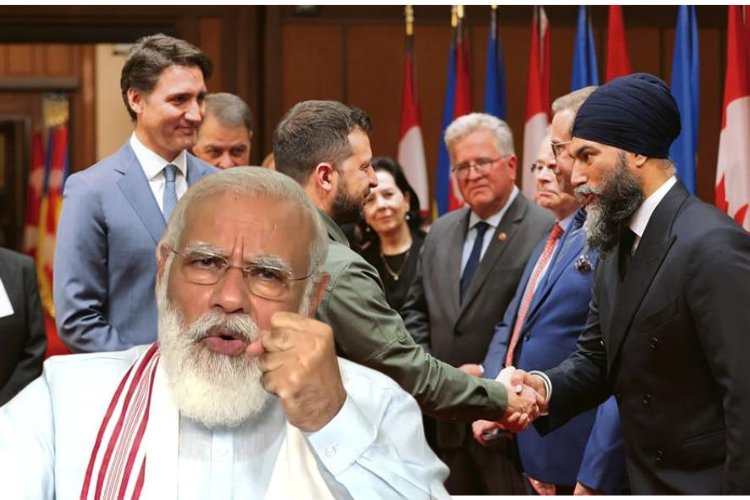Analysis of Diplomatic Tensions Between Canada and India
An in-depth exploration into the escalating diplomatic tensions between Canada and India sparked by the killing of a Sikh leader in Canada. We examine the impact of the current political climate on the Indian diaspora and the prospects for future relations.

The Escalation of India-Canada Conflicts
Things between Canada and India have blown up over the killing of a Sikh leader in Canada. The Canadian prime minister said India was involved, which really stirred things up and
India says the accusation is totally absurd. They keep saying they want peaceful relations with Canada and are bummed out over how this went down.
In response to the finger-pointing, Canada kicked out a top Indian diplomat, making things even worse. So then India asked a Canadian diplomat to hit the road too, fuelling the fight even more.
This beef between Canada and India hasn't just messed up diplomatic ties. It's also affected Indian people and students in Canada. India warned its citizens about politically tolerated hate crimes and violence in Canada in a new statement. So now there's growing concern about the safety of Indians living there.
The Canadian PM's accusation really ticked off India. Many say he made unfounded allegations without real evidence. Even opposition politicians in Canada have criticized him for how he handled this and questioned his judgment on the serious accusations.
The conflict between India and Canada goes back a long way. A big factor is the Khalistani movement, which wants to make a separate country for Sikhs. This has really affected how India and Canada get along, especially with the Sikhs living in Canada. It adds a lot of complexity to the relationship between the two countries, which is already kind of rocky.
It's pretty clear that it'll take a lot of work to get India and Canada to be friends again. Some experts think maybe Canada needs a new government for things to get better with India. but getting rid of the anti-India feelings in Canada might help lead to more positive stuff happening. and
The Khalistani movement and its impact
The Khalistani movement played a huge role in the tensions between India and Canada. This movement, which pushes for an independent Sikh state, has gotten a lot of support from Sikhs in Canada and has had a long-lasting impact on the relationship between the two countries.
There's a big Sikh community in Canada, and many of them have close ties to India. But some of them have been actively involved in the Khalistani movement, often using Canada as a platform to spread their message and gain support for their cause.
This Khalistani movement gained attention in the 1980s and '90s when India saw a spike in violent acts by militants wanting to break away from the country. The Indian government labeled the movement terrorist and took strict actions to limit its influence. Even with these efforts, the movement kept getting support from Sikhs living abroad in Canada. Groups in Canada that promoted Khalistan could operate freely, which worried India since it saw its work as threatening its sovereignty. Things like the 1985 Air India bombing by Khalistani militants in Canada made India's concerns worse. That awful incident killed 329 people, including Canadians and Indians, and further grew the mistrust between the two countries already there. You can't underestimate how the Khalistani movement impacted relations between India and Canada.
It's been a huge barrier to building positive connections since India has repeatedly accused Canada of ignoring what Khalistani supporters were doing there. From India's view, Canada's failure to decisively act against people involved in the movement was like tacitly approving and backing the cause. This perception strained diplomatic ties more and hindered work to build trust and cooperation between the two countries.
It's worth pointing out that not every Sikh in Canada is down with the Khalistani movement. A lot of Canadian Sikhs care about peace and getting along between their old and new homelands. To chill out the drama caused by the Khalistani stuff, we need a nuanced approach. Canada has got to address India's worries while also respecting people's rights and freedoms within its borders.
Balancing free speech and national security is tricky; it takes thoughtful discussion and working together.
It's important to build understanding between Sikhs in Canada and Canada on Khalistan, and encouraging open talks, promoting unity, and dealing with grievances can lead to a more inclusive and peaceful vibe in the community.
At the end of the day, finding common ground and working towards shared goals will be key for India and Canada to get past the tensions caused by the Khalistani movement. Building trust, encouraging cultural exchange, and focusing on shared interests can pave the way for a positive future for relations between India and Canada.
The Role of the United States in Indo-Canadian Tensions
The United States plays a big role in India-Canada tensions because of its close relationships with both countries. As a major player on the world stage, what the United States does and its policies can have a huge effect on how things go between India and Canada.
The United States has historically had close diplomatic and economic relationships with India and Canada. The U.S. has been an important partner for the two countries in areas like trade, defense cooperation, and cultural exchanges.
In recent years, the U.S. has actively tried to strengthen its ties with India as part of its plan to build alliances in the Indo-Pacific area. You can see this through things like the Indo-Pacific Vision, which aims to promote economic growth, security, and connectivity in the region. While the U.S. is trying to deepen its ties with India, it still has a solid relationship with Canada too. The two countries have a long history of working together and collaborating in areas like trade defense and information sharing.
However, the U.S.'s close relationship with India has raised some concerns in Canada. Some policymakers and experts have expressed worries that the stronger U.S.-India relationship might come at the expense of Canada-India ties and
In the past, Canada has been trying to walk a tightrope between its relationships with India and the United States. It's attempted to keep things copacetic with both countries at the same time. This calls for careful treading; any hint of favoritism could really tick off the other side, and at the same time, the U.S. could help chill things out between India and Canada. As a bigwig on the world stage, the U.S. is in a spot to encourage more chatting and teamwork between the two.
With its historical and current ties to both India and Canada, the U.S. can cultivate an environment more conducive to sorting out existing beef. Diplomatic efforts, mediation, and pushing dialogue at all levels could build bridges and foster understanding between all parties involved, and additionally, the U.S. can promote more trade and economic cooperation between India and Canada. By highlighting the mutual perks, the U.S. can motivate both countries to strengthen economic bonds, which could then have a positive ripple effect on the overall relationship.
Basically, the U.S. plays a big role in the tensions between India and Canada because it's tight with both of them. The growing closeness between the U.S. and India could worry Canada, but it also gives America a chance to push them to talk and work together. If the U.S. uses its influence and gets involved in diplomatic efforts, it can help resolve the ongoing tensions and promote a more positive future for India-Canada relations.
Looking ahead at India-Canada relations, they're definitely strained right now due to issues like the Khalistani movement and recent diplomatic frictions. But even with the challenges, there's potential for a more positive future in how these two countries relate to each other. and
First off, it's important to recognize that India and Canada share common values and goals. They're both lively democracies committed to diversity, multiculturalism, and inclusive growth. These shared values can be a solid base for improving relations between them.
Another promising thing is the economic potential between India and Canada. As two big economies, there are loads of opportunities for trade and investment. Trade relations already exist, with bilateral trade reaching high levels recently. Expanding and diversifying this trade could help strengthen the overall relationship between the two countries.
In addition, Canada has a big, globally competitive tech industry, while India is a top player in IT and software services. Joint research, innovation, and entrepreneurship efforts could benefit both and encourage more cooperation between the countries.
Besides economic teamwork, people-to-people relations could also improve India-Canada ties. Both have large Indian communities that can promote understanding and build bridges. Promoting cultural exchanges, education cooperation, and tourism can further strengthen the connection between the people of India and Canada.
To steer India-Canada relations towards a brighter future, constructive discussion between them is key. Open and honest communication can address concerns, clarify misunderstandings, and identify common goals. Regular high-level diplomatic meetings like state visits and bilateral meetings can provide platforms for these talks.
Resolving the long-running Khalistani issue will be critical. Canada's got to take real steps to address India's worries about Khalistani supporters’ activities in India. Ensuring the safety of Indians in Canada is paramount to restoring trust and normalizing relations.
On the Indian side, if they can recognize and appreciate Canadian multiculturalism and the contributions of the Sikh community, it could help bridge the gap caused by the Khalistani issue. Pointing out the good work and accomplishments of Sikhs in Canada might lead to a more inclusive perspective, get away from the divisive talk around the Khalistani movement, and
While India and Canada have some big challenges in their relationship, there are also chances for a more positive future. By using their shared values, looking into economic opportunities, encouraging people-to-people connections, and having constructive talks, India and Canada could get over their differences and build a stronger partnership. Both countries might benefit from working together in several areas, and investing in the relationship could bring advantages for both sides and help create a more harmonious and prosperous future.
Meanwhile…
You can just join our account management program and relax. We will make at least 1% profit for you on your account – Check out how by clicking on the link below.
Have fun trading!
Have a great journey, and may you catch some big waves on your way to prosperity!
To see this for real, click here.
https://www.myfxbook.com/members/SankarGanesan/tradefxp-trend-antitrend-day-trading/10404725
To read why you should be with us, click here
To open an account, click here.
To see our regulation certificate: click here.
To see our news with the IFMRRC: click here.
For claims, click here.
For the main site: click here.
For blogs and articles: click here.
Main Website: www.tradefxp.com



 admin
admin 










